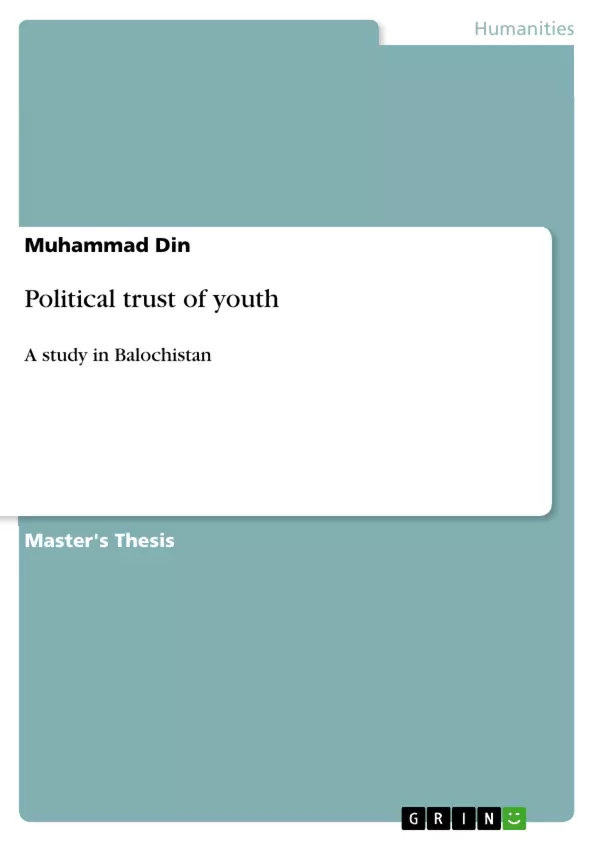The purpose of this study is to explore the level of political trust among youth.
The study was conducted in Quetta city. A sample of 400 students was taken from three public sector universities of Balochistan. A questionnaire was designed to collect data from the students who were at the age group of 18-30. The results revealed that there was a negative correlation between age of the respondents and political trust, while party agenda and government policies were having positive correlation with political trust.
To keep in mind the future role of youth in politics is essential for the democratic process. It is suggested that government should take necessary actions to provide proper youth policy and better facilities of health, education and employment. Similarily in order to provide better averment political parties should also give chance to youth in politics.
Inhaltsverzeichnis (Table of Contents)
- CHAPTER ONE
- INTRODUCTION
- Statement of the problem
- Research objectives
- Hypothesis of the study
- Significance of the study
- CHAPTER TWO
- LITERATURE REVIEW
- Theoretical framework
- Conceptual framework
- CHAPTER THREE
- RESEARCH METHODOLOGY
- Research design
- Universe of the study
- Population
- Target Population
- Sampling Procedures
- Sampling frame
- Sampling technique
- Sample size
- University wise distribution of the respondents
- Gender Proportion of Respondents
- Technique of data collection
- Tool of data collection
- Pre-Testing
- Data analysis
- Reliability of the instruments
- CHAPTER FOUR
- DATA ANALYSIS AND PRESENTATION
- Uni-Variate data analysis
- Bivariate analysis
- Regression analysis
- CHAPTER FIVE
- RESULTS AND DISCUSSION
- Major Findings of the Study
- CONCLUSION OF THE STUDY
- Suggestions
- References
Zielsetzung und Themenschwerpunkte (Objectives and Key Themes)
This thesis examines the political trust of youth in Balochistan, Pakistan. The study aims to understand the factors influencing this trust, as well as its impact on youth participation in the political process.
- Political trust among youth in Balochistan
- Factors influencing political trust
- The relationship between political trust and youth participation
- The impact of political trust on youth engagement
- The role of social and cultural factors in shaping political trust
Zusammenfassung der Kapitel (Chapter Summaries)
Chapter One introduces the study, outlining the research problem, objectives, hypothesis, and significance. Chapter Two presents the theoretical and conceptual frameworks used in the study, drawing on relevant literature. Chapter Three details the research methodology employed, including the research design, sampling procedures, and data collection techniques. Chapter Four analyzes and presents the collected data, using uni-variate, bi-variate, and regression analyses.
Schlüsselwörter (Keywords)
The key terms and focus topics of this thesis include: political trust, youth, Balochistan, Pakistan, social factors, cultural factors, political participation, engagement, and research methodology. The study aims to provide insights into the complexities of political trust and its implications for youth in the region.
Frequently Asked Questions
What is the level of political trust among youth in Balochistan?
The study indicates that political trust varies, showing a negative correlation with age, meaning younger students tend to have slightly different trust levels than older ones in the 18-30 range.
How do government policies affect youth political trust?
The research shows a positive correlation between government policies and political trust, suggesting that effective policies can enhance the trust youth have in the political system.
What role do political party agendas play?
Party agendas are significantly linked to political trust; clear and appealing agendas tend to foster higher levels of trust among the student population.
What are the suggestions for improving youth engagement in politics?
It is suggested that the government provides better facilities for education and employment, and that political parties give more chances to youth to participate in active politics.
Why is youth political trust essential for democracy?
Youth are the future of the democratic process; their trust and participation are crucial for the long-term stability and legitimacy of political institutions.
- Quote paper
- Muhammad Din (Author), 2016, Political trust of youth, Munich, GRIN Verlag, https://www.grin.com/document/388245



